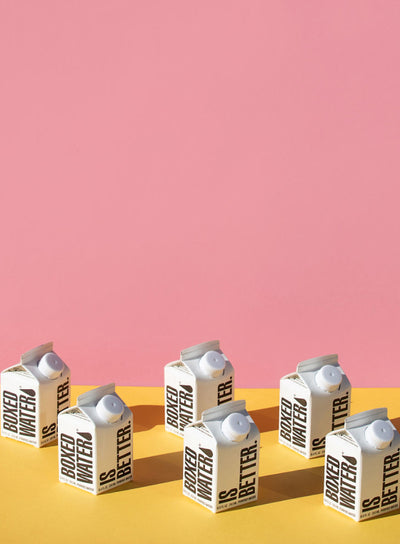After years of hiding in plain sight, plastic pollution is finally recognized as a fundamental contributor to climate change and a global crisis.
So far, recycling has been the solution touted by big soda companies and the plastic industry.
But recycling hasn’t worked for 75 years. Why? Because only 10 percent of plastic has been recycled, and, even when it is, recycling doesn’t address the front-end of the problem: the environmental impact of oil drilling and blow molding needed to produce single-use plastic bottles.
So, many of the beverage industry’s largest brands are now trying to pitch aluminum cans as the solution to single-use plastic bottles.
Coca-Cola (which owns the Dasani water brand) and PepsiCo (owner of Aquafina) both have the manufacturing power to produce canned water. And with marketing budgets exceeding $8 billion, there’s no shortage of resources available to craft a message that promotes aluminum as an infinitely recyclable solution and sustainable alternative to single-use plastic bottles. But is aluminum really sustainable?
The short answer is no. But, there's more you should know.
Aluminum doesn’t occur naturally in the environment — it has to be created using a mineral called bauxite. Like oil, aluminum is a limited resource and inefficient to produce. It takes approximately 20 tons of bauxite to make 1 ton of aluminum.
Bauxite is strip-mined and smelted in a process that requires an astounding amount of heat, water, and energy. The melting point of aluminum is remarkably high, meaning a substantial amount of water and electricity is needed in order to clean and crush bauxite during production. The massive furnaces used in this process deplete the ozone and cause smog and global warming.
The mining required to break down this mineral poses another threat to our environment. A side effect of aluminum production is a “red mud” residue that has the potential to cause harm to the environment and even local communities. Most “red mud” is disposed of in isolated areas, but even when it is, there is a potential for it to seep into the groundwater.
Additional environmental harm continues when shaping and molding aluminum for canned water and other beverages. Thousands of acres of forests are leveled every single year to mine for aluminum.
What can we do?
Reduce Plastic and Aluminum Use
Plastic is the worst choice — especially imported artisanal brands.
More than 8M metric tons of plastic flow into the oceans annually, and by 2050 there will be more plastic than fish in the ocean. Ironically, that same year, the production of plastic is forecasted to triple based on industry projections.
Ditch the plastic and reuse as much as possible. Aluminum isn't much better; avoid it when possible. An independent life-cycle study recently found that aluminum cans have a 200% larger carbon footprint than Boxed Water. You can read more about the study here.
Educate others and celebrate those that offer alternatives.
Look for Sustainable Packaging
Drinking carton water, like Boxed Water Is Better® is a more sustainable solution for our environment. Our plant-based packaging comes from trees, which are renewable. To help out on that front, we’ve planted over one million trees in collaboration with the National Forest Foundation!

